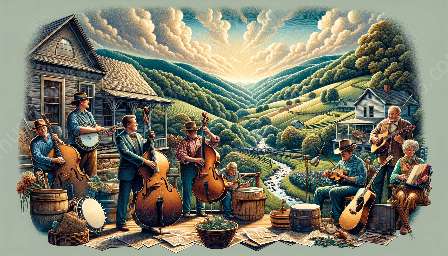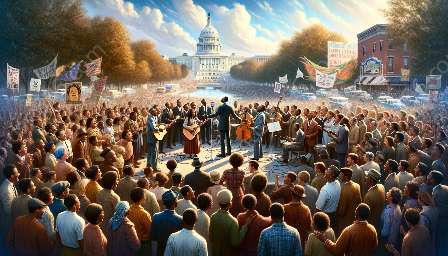Gospel music has played a significant role in preserving oral traditions and folk music, as well as in shaping the cultural landscape. To understand the impact of gospel music in preserving oral traditions and folk music, it is essential to explore the history of gospel music and its influence on the broader history of music.
History of Gospel Music
Gospel music emerged from the African-American religious experience, blending elements of African musical traditions with Christian hymns and spirituals. Its roots can be traced back to the late 19th and early 20th centuries, coinciding with the development of the blues and jazz. The genre gained prominence within African-American churches, serving as a form of spiritual expression and communal worship.
Over time, gospel music evolved, encompassing various subgenres such as traditional gospel, contemporary gospel, and gospel blues. The music's distinct characteristics, including powerful vocals, emotive delivery, and themes of faith and redemption, have resonated with diverse audiences, transcending cultural and geographical boundaries.
History of Music
The history of music is intertwined with the evolution of human civilization, reflecting the social, cultural, and political landscapes of different eras. From ancient civilizations to the modern era, music has served as a means of storytelling, cultural expression, and the preservation of oral traditions.
The Cultural Significance of Gospel Music
Gospel music holds immense cultural significance, serving as a cornerstone of African-American musical heritage. Its role in preserving oral traditions and folk music is intertwined with the broader narrative of African-American history, spirituality, and community resilience. Through its incorporation of call-and-response patterns, improvisation, and emotional depth, gospel music has been instrumental in transmitting oral traditions and folk music across generations, safeguarding cultural narratives and musical legacies.
Influence on Oral Traditions and Folk Music Preservation
The influence of gospel music on oral traditions and folk music preservation is multifaceted. Firstly, gospel music serves as a platform for storytelling, conveying narratives of struggle, triumph, and hope within the African-American community. Through its lyrical content and musical arrangements, gospel music preserves oral traditions by documenting historical experiences and cultural perspectives.
Furthermore, gospel music has contributed to the preservation of folk music by incorporating elements of traditional spirituals, hymns, and melodies passed down through generations. By infusing these folk music elements into its compositions, gospel music ensures the longevity and relevance of oral traditions within the contemporary musical landscape.
Cultural Continuity and Community Connection
Beyond preservation, gospel music fosters cultural continuity and community connection. Its role in oral traditions and folk music preservation extends to the preservation of communal values, spiritual beliefs, and collective memory. Gospel music gatherings, such as church services and concerts, provide opportunities for communal engagement and the transmission of oral traditions through shared experiences.
Conclusion
In conclusion, gospel music's role in preserving oral traditions and folk music is rooted in its historical significance, cultural influence, and ability to bridge past and present. As an integral component of the history of music, gospel music continues to shape and preserve oral traditions, ensuring the endurance of cultural narratives and folk music legacies for future generations.




































